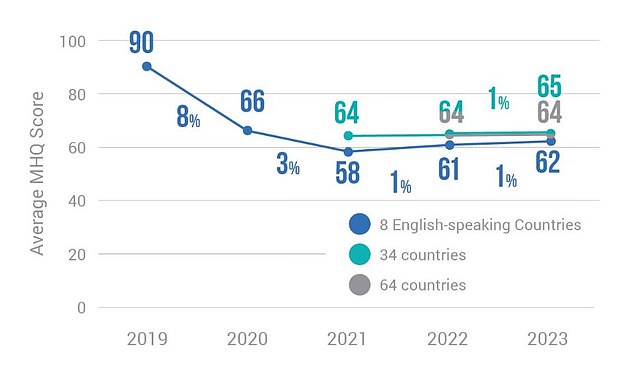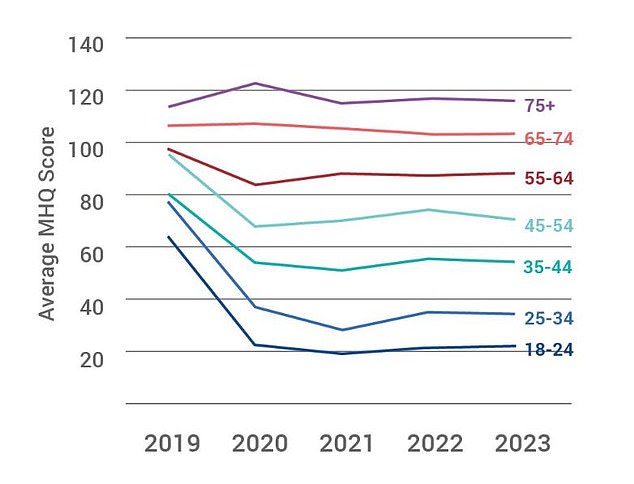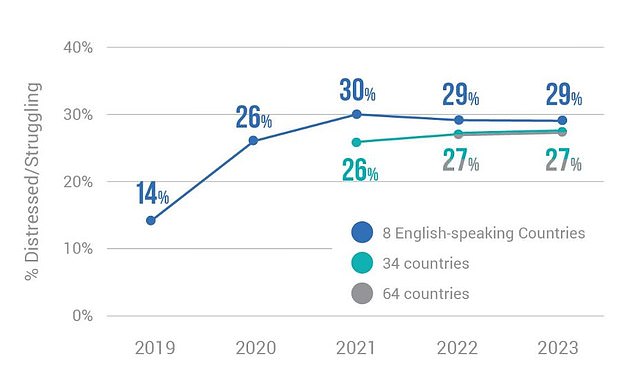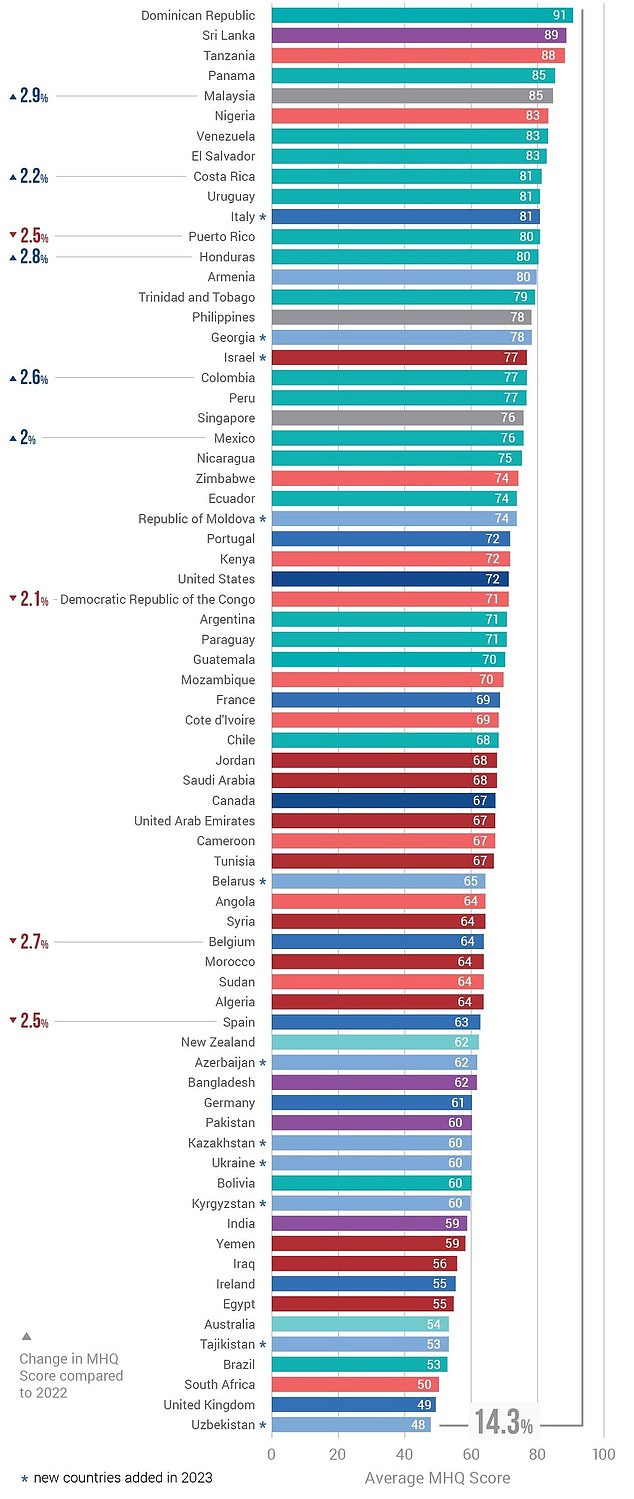Americans more miserable than people in Zimbabwe and El Salvador: Global report says erosion of family values, working from home and junk food are depressing the West
Americans are more miserable than people in Zimbabwe, El Salvador and Armenia, a ‘worrying’ global report has found.
The US ranked 29th out of 71 countries in 2023 in mood, outlook on life and self-esteem, while Canada ranked 40th and Britain 70th.
By comparison, poor African and Latin American countries scored the highest, with the Dominican Republic in first place and Tanzania in third.
Researchers from the nonprofit Sapien Labs said the pandemic has caused mental health to plummet in the Western world and there is no sign of recovery five years later.
In affluent countries, children tend to get phones at a younger age and consumption of ultra-processed foods is much higher.
The erosion of friendships and family unity, plus the increase in working from home, could also be ruining mental health, the researchers said.
The US ranked 29th out of 71 countries in 2023 in mood, outlook and self-esteem, while Canada ranked 40th and Britain 70th

The graph shows trends in mental wellbeing between 2019 and 2023. Since 2021, the average MHQ has changed little
“The insights in this report paint a worrying picture of our post-pandemic outlook and we urgently need to better understand the drivers of our collective mental well-being,” the researchers said.
In English-speaking countries in the West, those under 35 saw the biggest decline in mental wellbeing, both during and after the pandemic, while those over 65 remained relatively stable, the report found.
The researchers collected data from more than 50,000 respondents in 71 countries, with 11 new countries added by 2023.
Data was collected using the MHQ assessment, an anonymous online survey of cognitive and emotional abilities that provides an overall mental well-being score.
The survey also collected information on demographics, lifestyle factors such as diet and smartphone use, friend and family dynamics, and trauma and adversity.
Mental well-being was broadly defined as an individual’s ability to cope with the normal stresses and adversities of life and to make a productive contribution to society.
The MHQ score ranged from -100 to 200. A score below zero was classified as distressed or struggling, between 0 and 50 meant persistent, 50-10 meant they were hanging in there and between 100 and 200 meant they were succeeding or flourished.
The average MHQ score across the 72 countries in 2023 was 65 out of 200, they found.
About 27 percent of respondents had problems or struggled, while 38 percent had success or prospered, which is almost identical to the scores from last year’s report.
The five countries with the best mental well-being are the Dominican Republic, Sri Lanka, Tanzania, Panama and Malaysia.
The Dominican Republic perhaps scores the best for its more relaxed lifestyle and simple way of life. It also ranks high in cleanliness and safety among Caribbean countries.
As an Asian culture, Sri Lankans have very strong family values, which contribute to greater mental well-being. The country also has a simple way of life.
Honduras and El Salvador also rank in the top 15 countries for mental well-being, despite so many immigrants coming to the US every year.
This may be because the report only looked at mental wellbeing and not things like the financial status of individuals.
At the other end of the scale are the bottom five: Tajikistan, Brazil, South Africa, Great Britain and Uzbekistan.
The US Department of State has designated Uzbekistan as a country of special concern due to the religious persecution practiced in the country, and has defined Uzbekistan as “an authoritarian state with limited civil rights,” which could explain why the country is at the bottom of the list stands.
Tajikistan, in Central Asia, has been an authoritarian regime since 1994. There is corruption and human rights abuses, including torture, and a lack of religious freedom.
The researchers found that national prosperity indicators, such as GDP per capita, were negatively correlated with average mental well-being scores.
Of the 71 countries, eight English-speaking countries have followed since 2019, with a further 32 countries since 2021 and 64 since 2022.
In English-speaking countries, the average MHQ fell by eight percent (24 MHQ points) between 2019 and 2020, coinciding with the onset and global spread of the Covid-19 pandemic.
In 2021, the average MHQ for these countries fell by a further three percent (8 MHQ points), possibly due to continued Covid restrictions such as lockdowns and the need to adapt as things opened up.
Since 2021, the average MHQ, as well as the percentage of respondents in need or struggling, has changed little.
This suggests that although declines in mental well-being have stalled during the pandemic, there has been no recovery to pre-Covid levels since then.

Age trends from 2019 to 2023

Since 2021, the average MHQ, as well as the percentage of respondents in need or struggling, has changed little
The other major trend the researchers noted is that mental well-being is worse in younger age groups.
This movement is visible in every country among people who have access to the internet.
Before 2010, younger age groups always scored the highest in studies of happiness, mood and outlook factors.
Between 2019 and 2021, the 18-24 and 25-34 age groups fell between 42 and 50 MHQ points or 14-17 percent of the scale, while the 35-54 age groups fell by 30-35 MHQ points and the age groups from 55-64 years with 15 MHQ points.
In contrast, those aged 65 and over did not see much decline during this period. Between 2021 and 2023, there has been little change in MHQ scores across all age groups in these eight countries, and in the 32 countries monitored over this period.
The Dominican Republic, Sri Lanka and Tanzania topped the rankings with MHQ scores of 88 or higher.
The US scored 72, a slight improvement over the US score of 70 in the 2022 report.
Britain scored just 49, up from its 2022 score of 46. Canada scored just above the average score of all countries at 67, compared to the previous year when it scored 64.
“This goes against our general perception that wealth increases well-being,” the researchers said.
One reason for this is the age at which a child gets their first smartphone, they said.
For today’s 18-24 year olds, who are the first generation to be born into a world of smartphones and social media, the younger they were when they got their first smartphone, the worse their mental health outcomes in adulthood.
About 74 percent of female respondents ages 18 to 24 who received their first smartphone at age 6 had MHQ scores that fell within a problematic or difficult range.

The report “runs counter to our common perception that wealth improves well-being,” the researchers said

The graph above shows mental well-being in different countries. The numbers on the bars represent the country’s average MHQ score, between zero and 100. The percentage score on the left of the graph represents the change in the MHQ score compared to last year
This dropped to 61 percent for those who bought their first smartphone at age 10, and 52 percent for those who bought their first smartphone at age 15.
Meanwhile, in the countries with the best mental well-being, the average age at which young people first own a smartphone tends to be older (around 14/15 in Latin America and 16 in Sub-Saharan Africa), while it is lowest in Australia, Canada, New York. Zeeland, Great Britain and the US (11 years).
Another important finding is the impact of processed food. The researchers found that more frequent consumption of ultra-processed foods led to substantially poorer mental well-being at all ages, with a broad impact on symptoms of depression and emotional and cognitive control.
For example, they found that more than half of those who eat ultra-processed foods every day suffer from or struggle with their mental well-being, compared to just 18 percent of those who rarely or never consume ultra-processed foods, a nearly threefold increase.
As smartphone ownership increases, less developed countries tend to have lower consumption of ultra-processed foods, while in countries like the US and the UK, ultra-processed foods account for 60 to 70 percent of food consumption.
A third factor is reduced family relationships.
The researchers found that 10 percent of 18-24 year olds didn’t get along with anyone in their family and preferred not to see them, compared to just three percent of the oldest generation.
At the same time, the risk of mental health problems in adulthood is four times lower if you have close family relationships.
Again, it was richer countries, such as the US and Britain, that reported the lowest ties with many adult relatives (23 percent) and the least stable and loving children’s homes (39 percent).
